Which SUV, 4x4, or Crossover tyres to choose and for what use? The term 4x4 now encompasses many types of vehicles: SUVs, Crossovers, Off-roaders…
In recent years, SUVs (4x4s designed for road use) have become some of the trendiest vehicles. To ensure these vehicles offer good driving comfort, tyre manufacturers have introduced numerous models with various features.
How do you make the right choice without making a mistake? If you want to know everything about 4x4 and SUV tyres, this guide is for you.
4x4 and SUV tyres vs standard tyres: what are the differences?
The tyres that fit 4x4s and standard passenger vehicles are different. Indeed, they must adapt to the opposing uses of these cars. 4x4s and SUVs are heavier and more powerful. They can also traverse more challenging tracks. For these reasons, 4x4 and SUV tyres are designed to support higher weights and more intense usage. Additionally, the tread pattern has a deeper design. Thus, they can offer excellent traction even in difficult conditions.
Which 4x4/SUV tyres to buy?
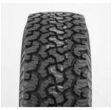
Learn more
Learn more
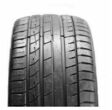
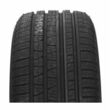
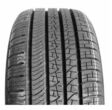
Learn more
Learn more
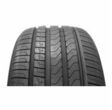
Learn more
Learn more
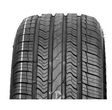
Learn more
Learn more
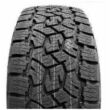
Learn more
Learn more
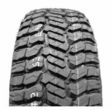
Learn more
Learn more
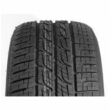
Learn more
Learn more
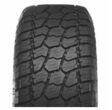
Learn more
Learn more
The most sought-after 4x4/SUV tyre sizes:
Technical characteristics recommended by manufacturers:
The first elements to base your tyre selection on are the technical recommendations from your car's manufacturer. Indeed, they recommend specific dimensions, load index, and speed index for the tyres of each vehicle.
If you do not strictly follow these recommendations, you risk fines and, more importantly, causing an accident. It is relatively simple to find this information in your vehicle's manual or on the door frame.
You can also read the markings found on the sidewall of the original tyres. Pay attention to the one that looks like this: 215/55R18 99V.
The number 215 is the width in millimetres of the tyre for your car.
The number that specifies the height here is 55 (but it is indicated as a percentage of the width). As for the load and speed indices, they are expressed respectively by 99 and V. The number 18 represents the rim diameter.
Choose 4x4 or SUV tyres according to your needs:
You have the choice between:
- Road tyres;
- Off-road 4x4 tyres;
- All-terrain 4x4 tyres.
Road tyres, perfect for SUVs:
They are primarily designed for city driving, particularly on national roads and motorways. They are easily identified by the "H/T" (Highway Terrain) marking generally found on their sidewall. They offer performance similar to those of passenger vehicle tyres. These are the models to choose for 4x4s intended for road use and SUVs.
To offer very good performance (grip, braking, comfort), this type of tyre has a less prominent structure, more flexible sidewalls, and low rolling resistance on tarmac.
They are more often fitted to SUVs, which are vehicles capable of easily taking a forest path, but are not well suited to truly rugged paths.
The recent trend in SUVs has pushed manufacturers to design tyres dedicated to this type of vehicle. You can now find tyres with the name SUV in the profile. Some profiles are dedicated to Ultra High Performance SUVs like the BMW X5M Competition, the Porsche Cayenne, or the Lamborghini Urus.
Off-road 4x4 tyres, essential for off-road journeys:
The tyres in this category are exclusively intended for off-road 4x4s. These very powerful wheels have great traction and can be recognized by the "M/T" (Mud Terrain) inscription they carry. They also have great resistance. It takes a lot for these tyres to suffer a puncture. Do you often drive your vehicle on very steep surfaces, rocky or muddy tracks? Then off-road 4x4 tyres are perfectly suited for you.
You can notice the large width of their rubber lugs, as well as their more robust sidewalls and quite deep cuts. Their structure is completely reinforced with numerous sculptures on the rubber. The combination of all these elements makes the off-road 4x4 tyre your best ally for off-road driving in the best conditions.
However, despite their great performance, avoid using 100% off-road tyres for city driving. Due to their characteristics, they do not offer good adherence to tarmac. This results in weaker road holding, longer braking distances, and high rolling noise on asphalt…
Some off-road tyres are not road-approved, the NHS (Not for Highway Service) specification indicates this.
All-terrain 4x4 tyres (All Terrain):
These versatile wheels, recognized by the A/T (All Terrain) marking, offer a good compromise for both off-road and on-road circulation. If you don't really fit into either of the two situations described above, then all-terrain tyres are what you should fit to your car.
They are perfectly suited for those who need to alternate between urban driving and off-road. They can indeed be used as SUV tyres. Quiet and comfortable, they also offer good traction on sand, mud, and grass.
However, as you might guess, they should not be pushed too hard when driving in very challenging environments. Moreover, on tarmac, they do not provide as good performance as road tyres.
When to change the tyres of a 4x4/SUV?
The frequency at which you need to change the tyres of a 4x4 or an SUV depends on several factors, such as the use of the vehicle, driving conditions, tyre quality, and manufacturer recommendations.
The legal minimum tread depth is 1.6 millimetres. However, for better grip, we suggest replacing the tyres at a depth of 3 to 4 millimetres.
If you often drive in challenging conditions, such as rugged roads, muddy or snowy terrains, your tyres may wear out more quickly. In such conditions, it is essential to regularly check tyre wear.
It is recommended to frequently perform a visual inspection of the tyres. Look for signs of uneven wear, cuts, bulges, or other damage. If you notice any issues, it may be necessary to replace the tyres earlier than expected.
Regularly check the inflation pressure (at least once a month) to avoid balancing issues. This will also help extend the life of your SUV or 4x4 tyres.
General questions about using SUV/4x4 tyres:
Should I change all 4 tyres on a 4x4?
The tyres of a 4x4 should be changed by fours. Therefore, you cannot change one or two wheels on an axle and keep the others. Always install 4 identical tyres during each replacement operation. They must therefore be from the same brand and have the same dimensions, speed and load indices, tread patterns…
If you do not follow this recommendation, the transmission will not operate correctly. This will also promote the deterioration of some mechanical parts, the repair of which can be expensive.
Is it mandatory to change all 4 tyres on an SUV?
It is often recommended to change all four tyres simultaneously on an SUV to ensure even wear and maintain the stability and performance of the vehicle. But if your SUV does not have all-wheel drive, then you are not required to change all your tyres at the same time.
What tyre pressure for a 4x4/SUV?
The optimal pressure varies depending on the SUV/4x4 model and can be found in the owner's manual, on a label in the driver's door frame, or near the fuel filler cap. It is essential to maintain the recommended pressure for the safety and efficiency of the vehicle.
How to read a 4x4/SUV tyre?
The information found on the side of a tyre includes the size, load index, speed index, and sometimes symbols. These indications help verify compatibility with your vehicle.
What size tyre for an SUV/4x4?
The tyre size must match the manufacturer's specifications for a correct fit with the rims and optimized performance. You can find this information in the owner's manual, on a label in the driver's door frame, or in the fuel cap. You can also refer to the size written on your tyres.
Some 4x4 tyres have US dimensions, we invite you to consult our page on converting US tyres to EU tyres.






